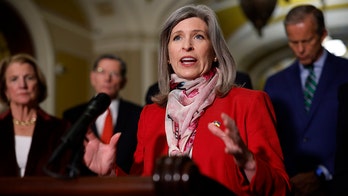Ten years after a mail-borne anthrax attack killed five in the worst bio-terror attack on U.S. soil, there are new questions about the strength of the FBI’s case against the only suspect, as a leading expert on bio-terror attacks warned that budget deficits are likely to hinder the nation’s ability to respond in the future.
“Unfortunately, it seems we have hit the snooze button because of recent cutbacks on the federal, state and local level,” Jeffrey Levi of Trust for America’s Health, a nonpartisan group for public health issues, told the Senate Homeland Security Committee on Tuesday. “We could face the sad irony that if another attack were to occur we may be better prepared than we were 10 years ago, but possibly not as better as we were three years ago.”
Sen. Susan Collins, the committee's ranking Republican, said the new head of al Qaeda, Ayman al-Zawahiri, had the right background to wage a biological attack in the coming years.
Al-Zawahiri “has a medical background that raises concerns that he may have an even greater interest in pursuing chemical and biological terrorism,” Collins told the witnesses.
The sobering assessment was part of the committee’s series of investigations into the aftermath of 9/11 and the anthrax attacks. In fall 2001, less than a month after the Sept. 11 terrorist attacks, as many as seven anthrax-laced letters were sent, killing five Americans, paralyzing the postal system and prompting thousands to take the antibiotic cipro.
In 2008, Army scientist Bruce Ivins was identified by the FBI as the lead and only suspect in their investigation. That same summer, Ivins died from an apparent suicide. A Tylenol overdose was publicly blamed. More recently, court filings have cast more doubt on the strength of the FBI’s case against Ivins, when it was shown his lab did not have the equipment needed to make the anthrax powder. Nor was Ivins the only army scientist with access to the source of anthrax believed to be a flask at Fort Detrick in Maryland.
Rep. Rush Holt saw the FBI investigation up close because the letters were mailed from his New Jersey district. In a recent opinion piece published in the Asbury Park Press, Holt said the bureau’s investigation did not inspire confidence.
"As FBI Director Robert Mueller ultimately acknowledged to me, the case against Ivins was almost entirely circumstantial. ... The FBI has said it does not have any direct, physical evidence tying Ivins to the attack," Holt wrote.
One of the lingering mysteries of the case is the "Quantico letter," an anonymous letter was sent on Sept. 21, 2001 – the same time week anthrax was mailed to the New York Post and NBC. The letter, first obtained by Fox News, appeared to be an effort to frame an Arab-American scientist at Fort Detrick for the anthrax attacks.
“This guy is a potential terrorist," it warned. "He believes strongly that the U.S. Government needs to be taught a lesson…This guy has access to many dangerous biological poisons."
The scientist implicated in the letter, Ayaad Assaad, was interviewed by the FBI in 2001 and cleared of any connection to the anthrax, but a decade later, Assaad told Fox News he remains convinced the letter is connected to the Anthrax case.
“I showed (the FBI) statement by statement how they (the letters) are similar and how they might be coming from the same source,” Assaad told Fox.
Asked about Quantico letter and whether it was sent by the same person who sent the anthrax -- the FBI told Fox quote
“The Quantico letter was thoroughly investigated both with regard to who sent it as well as the allegations contained in it. The person mentioned in the letter did not mail the anthrax, and we were unable to determine who sent the anonymous Quantico letter."
Rep. Holt wants a special committee to investigate whether the U.S. is better prepared to handle similar bio-attacks in the future and why the FBI seemed to pursue the wrong leads in the anthrax case for so long -- including scientist Steven Hatfill, who earned a $5.8 million settlement because the feds publicly identified him as a person of interest.
National Correspondent Catherine Herridge's bestselling book "The Next Wave: On the Hunt for al Qaeda's American Recruits" was published by Crown on June 21st. It draws on her reporting for Fox News into al-Awlaki and his new generation of recruits – al Qaeda 2.0. It is the first book to fully investigate al-Awlaki, an American citizen, who was killed by a CIA-led operation in Yemen last month.





